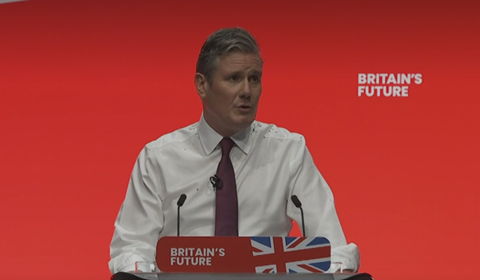Labour leader unveils proposal to “bulldoze” the planning system and build 1.5 million homes in five years as party aims for decade in power
Keir Starmer has pledged to “get Britain’s future back” by building 1.5 million homes over the next five years, “bulldozing” the planning system and constructing a wave of new towns across England.
Targeting two consecutive terms in power, the Labour leader promised to “build a new Britain” during a decade of “national renewal” following 13 years of Conservative-led government.

“What is broken can be repaired, what is ruined can be rebuilt,” he told delegates at the party’s conference in Liverpool, potentially the last before next year’s general election.
During an hour-long speech which started with a protester storming the stage and pouring glitter over Starmer, the party leader blasted what he described as the Conservative’s “sticking plaster politics” and said Labour was a “party of service”.
He said the party would launch a new plan to “fight the blockers who hold a veto over British aspiration”, including “land-banking” developers and councils that “refuse to develop a local plan because they prefer a backdoor deal”.
He singled out the planning system as “one barrier so imposing that it… stops this country building roads, grid connections, laboratories, train lines, warehouses, wind farms, power stations – an obstacle to the aspirations of millions.”
“A future hidden by our restricted planning system, and we must bulldoze through it,” he added.
∫√…´œ»…˙TV 1.5m over five years means housebuilding would hit 300,000 homes a year on average. ∫√…´œ»…˙TV‚Äôs sister title Housing Today‚Äôs has been calling for the current Conservative-led government to recommit to its 300,000 homes a year pledge with a plan of action to get there.
Starmer said Labour would build the “next generation of new towns” on land acquired by state-backed developers. They would be given powers to buy land at lower prices, without having to factor in the usual increase in the value for potential planning permission.
Planning rules would be rewritten to set out new design standards with a focus on providing “gentle urban development” with five-storey Georgian townhouses, Starmer said.
Developers meeting the standards would then be given “planning passports” to make it easier to build on brownfield land.
Labour would also allow development on low-quality green belt such as scrubland and car parks, dubbed “grey belt” by the party. Half of the homes to be built will be affordable.
Doctors’ surgeries, schools, transport links and other infrastructure would be “hardwired” into the plans, Starmer said in the speech.
Local councils will be invited to draw up proposals for the “large-scale” towns, with any affordable homes being put towards meeting their local housing targets.
The party would launch a six-month consultation to identify areas with “unmet housing need” and potential for growth which are suitable for new development.
Sites for the towns have not yet been chosen but Starmer’s team is said to be looking at Cambridge and the “M1 corridor” around Milton Keynes, according to The Times.
The leader has reportedly been working with Matthew Pennycook, the shadow housing minister, to draw up detailed proposals for an overhaul of planning rules to produce up to 100,000 more new homes a year.
Other announcements made by Starmer included a new generation of technical excellence colleges “planted firmly in the ground of young people’s aspirations”.
Angela Rayner, housing secretary, pledged on Sunday to boost affordable housing delivery by reforming the planning system and strengthening rules on developers to stop them “wriggling out of their responsibilities”.
Yesterday Rachel Reeves, the shadow chancellor, announced plans to speed up “critically important” infrastructure such as life sciences facilities, battery factories and 5G infrastructure.
Meanwhile, communities would be given incentives for allowing development, clearer national guidance would be set for developers to avoid unnecessary litigation and the stamp duty surcharge paid by non-UK residents would be raised to 3% to pay for 300 new planning officers.


























No comments yet